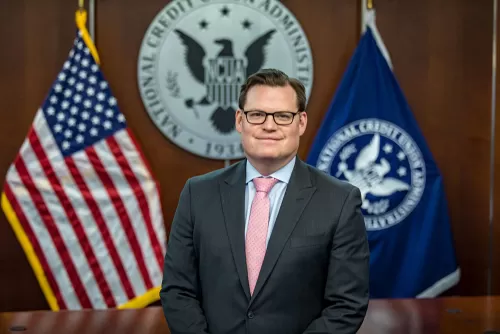NCUA's Vice Chairman Kyle S. Hauptman at the NCUA's headquarters in Alexandria, Virginia.
As Prepared for Delivery on April 21, 2022
Thank you, Miguel, for your presentation. Nice job, especially because I believe this is your first time presenting.
I’d like to mention that when interviewed you for this role, there were a number of qualified candidates. But after our conversation last week I’m even more convinced that you’re the right person for this job.
I wholeheartedly agree with Chairman Harper and Board Member Hood on their commitment to leveraging the power of diversity and inclusion within the NCUA. Miguel, I’d like to congratulate you and your team for the work you are doing to foster greater diversity and inclusion in the agency. We are better and stronger when we utilize the full range of skills and insights that come from a diverse workforce.
I’d like to talk about financial inclusion in general. As the original answer to financial inclusion in America, the credit union movement itself is, by definition, diverse. As you know, we have credit unions formed around faith-based groups. We have credit unions formed around ethnic groups such as the 11 Ukrainian-American credit unions. There are credit unions amongst American Indian tribes. And we have credit unions formed around employee groups, such as public servants, farmers, military personnel, educational systems, and so much more.
In order to maintain that diversity among credit unions, — including among more recent immigrant groups — I feel the NCUA should also focus its DEI efforts on how our regulatory practices affect financial inclusion among America’s 130 million credit union members, and not mostly focus on the NCUA’s 1,100 well-educated employees.
Let me give an example: in preparation for this meeting, I read our press release for last year’s OMWI report. It mentions that NCUA facilitated a number of conversations on racial injustice after the 2020 death of George Floyd, and that’s an important topic. But I recently found out that, at the same time as George Floyd’s death in Minneapolis, a group was trying to start a new credit union in George Floyd’s neighborhood in North Minneapolis, an area with many pay day loan shops but few quality financial services options. That group’s organizer said last month that she felt “humiliated” by how hard the NCUA made the de novo process. The group gave up on a federal charter and are now pursuing a state charter, but they still feel the NCUA wasted their time by not clarifying the work needed for a federal charter versus just seeking NCUA insurance.
Now I’m proud that, over the last year, we’ve made progress on our chartering process. Because regardless of what we say about supporting small credit unions and minority depository institutions, neither of those categories include those trying to start a new credit union.
But that example from George Floyd’s neighborhood is what I’m talking about when I urge all of us at the NCUA to remember what true financial inclusion means.
The small credit unions, and those seeking a new charter, are people taking direct control of their financial well-being by forming their own credit union — a financial institution they own and control, dedicated to their specific needs.
And perhaps the only thing more satisfying than taking your business elsewhere, is starting your own business offering better products.
Thus, if we are serious about financial inclusion, we must be sure these groups have a clear path to form their own credit union. We — the NCUA — shouldn’t be making it one bit harder for groups starting the de novo process. Two weeks ago, we released our streamlined chartering guide and I’d like to thank the staff that made that possible. But we can’t stop there.
I’d like to call on my fellow NCUA Board members to make financial inclusion more prominent in our thinking throughout all of NCUA’s operations. We can’t congratulate ourselves on our DEI efforts if we add any extra burdens on small credit unions and those seeking to start one.




